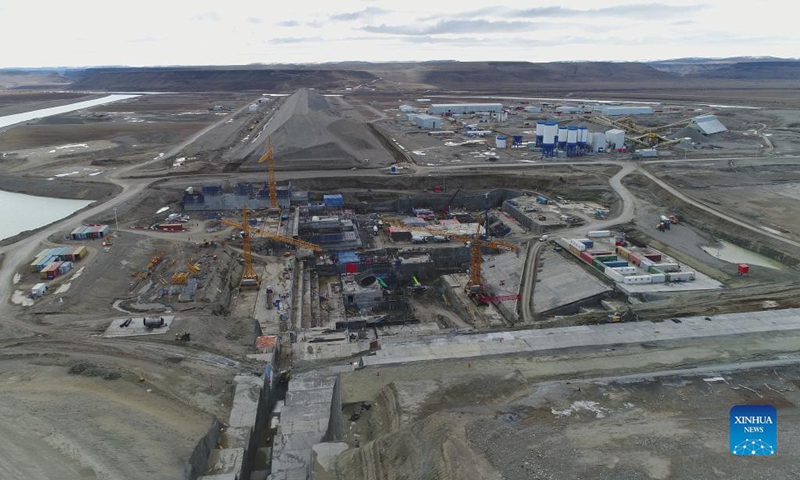
Aerial photo taken on Aug. 26, 2021 shows the Nestor Kirchner-Jorge Cepernic Hydroelectric Power Plant under construction in southern Patagonia, Argentina. (Gezhouba Group Corporation/Handout via Xinhua)
National People's Congress deputies and CPPCC members met this week for the two sessions. Chinese foreign policy is not the central theme of the country's most important annual meeting, but State Councilor and Foreign Minister Wang Yi's press conference on Monday attracted special attention in light of the conflict in Ukraine and the role of China.
Nothing is more important for China on the international stage at this time than a peaceful solution between the Russians and Ukrainians, but a specific comment by Foreign Minister Wang about Latin America and the Caribbean drew attention to that part of the planet when he said that it is " a region of promise and vitality. It is not the backyard of anyone." Historically seen as a "backyard" of the US, the stage of countless invasions and coups d'état engineered or supported by the White House, the region has been getting closer and closer to China, mainly through the BRI. The recent accession of Argentina after President Alberto Fernandez's visit during the Beijing Olympics, the new cooperation agreements between China and Cuba, and the re-establishment of diplomatic relations between China and Nicaragua have made an impact.
Wang's remarks came at an opportune moment. Less than a month ago, the US Congress introduced the "Western Hemisphere Security Strategy" bill, which provides for measures to curb cooperation between China and Latin American and Caribbean countries. Incidentally, a day after Wang's remarks, the commander of the US Southern Command, General Laura Richardson, could not have been less categorical in her testimony to the Congressional Armed Services Committee. According to her, there is a risk that Chinese influence in the region will become akin to the selfish "predatory influence it now has in Africa." Certainly, African countries disagree with General Richardson's statement while Latin American people have no doubt who has always played a "predatory and selfish" role in their region.
The tension in Latin America is bounded to increase in the future. On one hand, Washington's increasing loss of influence in the rest of the world increases its attachment to maintaining its "backyard." On the other hand, the new wave of progressive governments in the region, which are trying to resume a policy of sovereign national development, tend to threaten US hegemony. In recent years, the electoral victories of left and center-left presidents in countries like Argentina, Chile, Bolivia, Peru, Mexico, and Honduras have added to Cuba, Venezuela, and Nicaragua and have been changing the regional correlation of forces.
For the first time in years, the Colombian left has a chance of victory in the presidential election taking place this week. There is also a great possibility that Lula will be president of Brazil again in October, which would change the political chess on the continent for good.
Our last progressive tide ("pink tide"), which peaked at the end of the first decade of the 21st century, achieved advances such as economic growth, social policies, and geopolitical strengthening (with the creation of UNASUR, CELAC, and BRICS), despite its numerous limitations. Still, it was enough to awaken the reaction of the US, which increased sanctions on Venezuela and Cuba, and supported coups in Honduras, Paraguay, Brazil, and Bolivia, among other measures to weaken regional sovereignty.
In the last year, the partnership between China and Latin America and the Caribbean has advanced. Beijing has shipped more than 400 million doses of COVID-19 vaccines to the region, and even with the pandemic, bilateral trade exceeded $400 billion for the first time in history.
Our export agenda to China is still very much based on commodities, which are important economically, but insufficient to strengthen the economy of the region, which needs to industrialize again, while adding new technologies. The case of Argentina can serve as a model for new modalities of cooperation with the Chinese. Buenos Aires has signed a series of agreements with Beijing: railway reform ($4.7 billion), construction of a nuclear power plant ($8 billion), and a new hydroelectric plant. With the new agreement for Argentina's membership in the BRI, an additional $23.7 billion will be earmarked for investments in the country, mainly in infrastructure projects and export expansion.
As former Brazilian President Dilma Rousseff said in a speech in Buenos Aires in August last year: "our place is not with the USA, but is independence, alongside China."
The author is a research fellow of the Tricontinental Institute for Social Research.
opinion@globaltimes.com.cn




